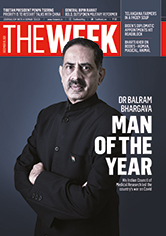Right choice
THE WEEK has made the right choice by selecting Dr Balram Bhargava, the head of the Indian Council of Medical Research, as Man of the Year 2021 (‘The doctor to doctors’, December 19). He has rightly acknowledged that the superheroes of the day are scientists, who change, adapt and innovate for a better tomorrow.
Zeroing in on Bhargava as Man of the Year must have been an arduous task for THE WEEK with some equally competent people around—Randeep Guleria, Krishna Ella, Adar Poonawala, Srinath Reddy, and many more, who were at the forefront of the battle against Covid-19.
Parthasarathy Mandadi,
On email.
Bhargava has dedicated his life to medical science, public health and crisis-management. The ICMR, which was until now out of the public eye, has become a household name after the sudden advent of Covid-19.
I wish Bhargava a long life with sound health. I hope he continues to tackle challenges with commendable zeal.
M.Y. Shariff,
On email.
In your cover story you have appropriately brought out the fascinating work of Bhargava and his leadership role in the ICMR. India is fortunate to have such brilliant scientists and doctors, who chose to remain in India despite lucrative offers abroad.
Despite inadequate infrastructure and insufficient funds for research, Bhargava and other scientists have contributed to the indigenous development of science and technology, purely out of patriotism and love for the development of the nation.
I hope, in the coming years, THE WEEK will publish more such stories to inspire students to choose pure science in higher education, and to remain in the country.
K.V. Jayaram,
On email.
An inspiration
The demise of General Bipin Rawat, India’s first chief of defence staff, is indeed a bolt from blue and an irremediable loss for the country (‘Agent of change’, December 19).
He was not only a senior and dynamic officer, but an institution in himself. With his comprehensive thinking, he incisively shaped the armed forces during his tenure.
Rawat did his utmost to make the Army not only self-sufficient but also one of the finest in the world. The void caused by his death will not be easily filled. His life will always remain an inspiration for many officers in the Army.
Sunil Chopra,
On email.
I was amazed at the speed by which THE WEEK covered the horrendous helicopter tragedy in which Rawat and 13 others lost their lives.
THE WEEK was not only quick in feeling the gloom that pervaded the nation by the calamity, but it also brought out a fitting tribute to the brave and outspoken general who meant straight action and did not mince words.
Sanath Kumar T.S.,
On email.
Let’s adopt
What Swara Bhaskar is doing is commendable, even while having her eggs frozen and remaining open to the idea of having a biological child by IVF (‘Fostering a future’, December 19). If all of us adopt a baby, irrespective of having biological children, will it not be a great service to society and the nation?
Shweta Chaudhary,
Delhi.
Well-defined SOP
There are many things to ponder over when it comes to deployment of green energy solutions (‘Future Shock’, December 5). A comprehensive life-cycle analysis is essential to know the environmental impact.
Whether it is coal, petroleum, solar or wind, every stage, from production, deployment, operation and recycling will have environmental consequences. Early replacement of fossil fuels is inevitable. However, to avoid future shock, green energy solutions are to be deployed only within well-defined standard operating procedures.
Mathew G. Nanakkal,
Bengaluru.
Government should answer
I completely endorse the views of reader K.V. Jayaram, who said he could not find a proper hospital, competent doctors and essential medicines during the initial stages of the second wave in Bengaluru (‘Letters’, December 19).
We almost lost our son due to complications of Covid-19 in mid-April. My son, who is a corporate trainer, could have afforded treatment in a private hospital, as he had an insurance coverage. But we were desperate when no beds were available in any private hospital [in Bengaluru]. At that time there was a bed allotment scam happening in Bengaluru, which got exposed later.
When my son was gasping for breath, with his oxygen levels dropping to 71, we rushed him to the emergency unit of a private hospital after midnight. The dedicated and overworked nurses were able to bring back my son’s oxygen saturation level to 90 after six hours.
The biggest irony was that my son was to be discharged and sent home with pneumonia, as no beds were available. But, thanks to the wisdom of an infectious disease specialist at Aster CMI Hospital, who insisted that my son had to be hospitalised, we were able to get a bed in St Philomena’s Hospital. There he received the best care from doctors and nurses, which saved his life. Alas, thousands of other unfortunate families were not as lucky.
I have a heavy heart each time I think of those families who could not get their loved ones admitted in Bengaluru back then because of shortage of beds. We, the citizens of Bengaluru, want to know how many people have been booked and convicted in the bed scam so far. Families who lost their loved ones as a direct consequence of the bed scam need answers.
V.R. Sashidhar,
Bengaluru.

